100th Anniversary Great Nave Tour at the Cathedral of St. John the Divine
Celebrate the 1925 construction of the stunning nave inside the world's largest Gothic cathedral!


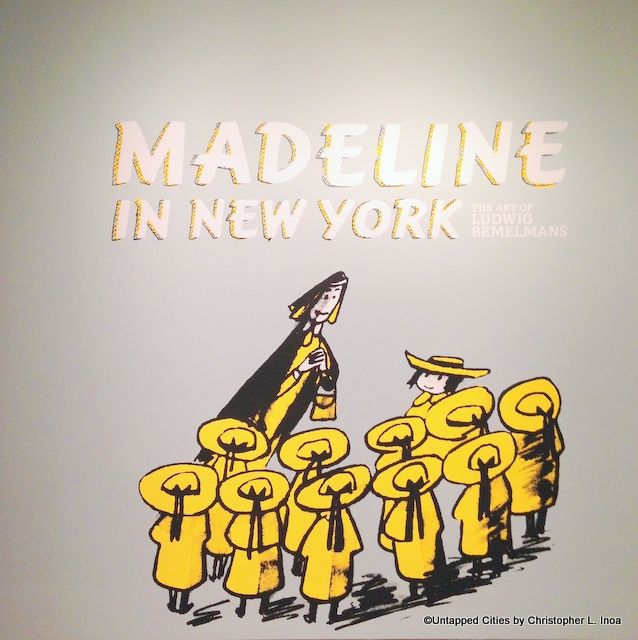
It’s hard to believe that it’s been 75 years since twelve little girls in two straight lines were introduced to the world. This Friday, The New York Historical Society Museum & Library is opening their newest exhibit, Madeline in New York: The Art of Ludwig Bemelmans, in celebration of the beloved children’s literature and media franchise Madeline, and in honor of the life and work of her creator, writer and artist Ludwig Bemelmans. The retrospective of Bemelmans work (the first in 50 years) features over 100 classic and recently discovered drawings, paintings, sketches, photos, memorabilia and commissioned works of art. While the character Bemelmans created 75 years ago is known to countless children and adults worldwide as Parisian; President of the NYHS Dr. Lousie Mirrer made it clear that Madeline’s “biography is a New York story,” with much of Bemelmans’ inspiration coming from the city where he made his home.
Since Madeline’s introduction in 1939, she has graced everything from books, to toys, to video games, to live action cinema to children’s cartoons. What started out as a story about a girl living in an old house in Paris has become a media empire. But her success wasn’t always so clear. Despite its eventual fan base, when Bemelmans first showed May Massee–an editor working for Viking Press in NYC who told him specifically when they first met that he “must write children’s book’s!–the first Madeline book, she refused to publish it. Massee felt that the book was too complicated for younger reader, which turned out to be the greatest mistake of her career.
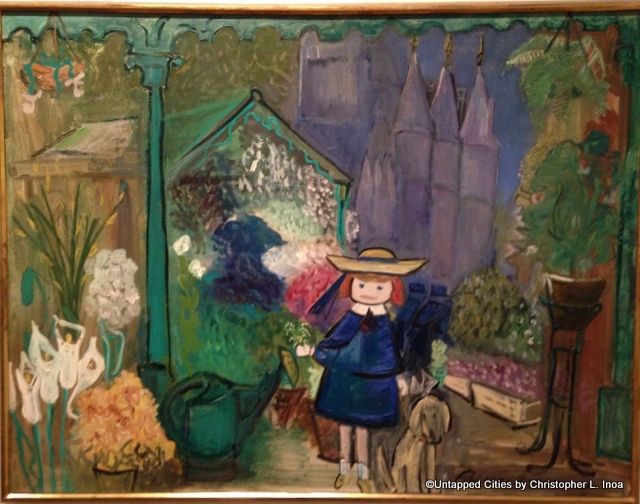
Madeline at the Paris Flower Market, 1955. Oil on canvas.
The book’s initial underdog status has something in common with its author, as Ludwig Bemelmans’ life is something out of a Wes Anderson film. Born to a Belgian father and German mother, he lived his early life inside one of the many hotels his father’s family owned in the Austrian Tyrol. Early on, his father deserted him and his mother for Ludwig’s French governess and with nowhere else to go, his mother took him to live with his grandparents in Germany. Ludwig’s transition did not go very well; he performed terribly in school, never once passed an exam and had to repeat the same grade three times. When his apprenticeship at his uncle’s hotel fell through because he shot a waiter for reasons unknown, he choose to emigrate to America to avoid reform school.

“His Love of Animals Was Such” – Madeline and The Bad Hat. Gouache on Paper
He arrived in Ellis Island in 1914, and a year later he was a busboy in the Ritz Hotel, working his way up to assistant manager. It is during these years in NYC that his love of hotels and restaurants began. But before he could transition that passion to literature and art, he enlisted in the Army during World War I and was stationed in a mental institution where he almost lost his own sanity. What saved him from the thoughts of suicide and the emptiness of the institution was art. He began to teach himself how to draw on paper, on walls and even on himself. In the 1920’s Bemelmans left the Ritz to begin a career in cartooning, starting on newspaper comics. His first published work was “The Thrilling Adventures of Count Bric a Brac,” a series that ran briefly in the New York World.
Bemelmans’ first book would not be published until 1934. Titled Hansi, it is based on his own childhood memories celebrating the winter holidays inside the many hotels his father’s family owned. It is his second book, The Golden Basket, in which Madeline makes her first appearance, however, for which he is much more remembered.
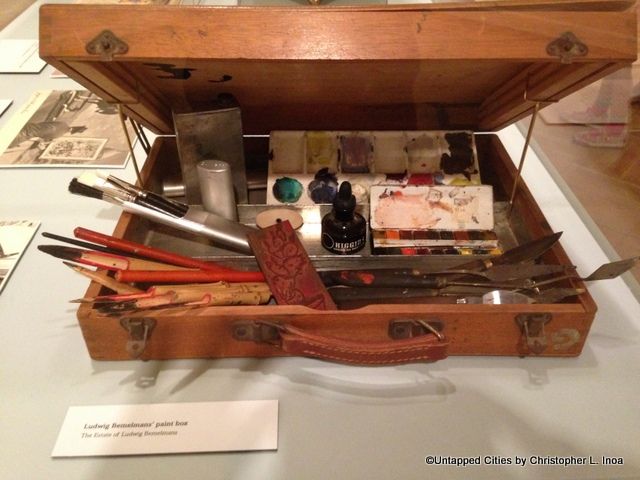
Ludwig Bemelmans’ Paint Box
The exhibit’s many paintings and drawings of Madeline are guranteed to envoke nostalgia for patrons of all ages. Just walking towards the entrance and seeing the image of Miss Clavel and her twelve little girls, all wearing bright yellow hats is enough to implant a smile across your face. Those who have only seen Madeline in children’s books would be astonished to learn that the man responsible for her creation painted canvases, lamps and even plates. The standout during our visit was Madeline at the Paris Flower Market, one of the most iconic artistic portrayals of Bemelmans’ character ever painted. We also ran into Bemelmans’ grandson, John Bemelmans Marciano, at the exhibit. Marciano has continued his grandfather’s legacy by contributing his own Madeline stories, including Madeline at the White House, a story originally conceived by Ludwig and former first lady Jackie Kennedy.
In addition to the many Madeline-related works, the NYHS showcases a significant amount of artwork pre-and-post-Madeline, some of which was only recently discovered in preparation for this exhibit. Before Madeline, Bemelmans created one-of-a-kind menus for fancy New York hotels and restaurants like the Waldorf and Luchow’s. In 1947, he was commissioned to paint what would become one of New York’s most historical art landmarks: the seasons of Central Park inside the Hotel Carlyle. Payment for the work was not in cash, but a residency inside the hotel for 18 months, something Bemelmans happily accepted.
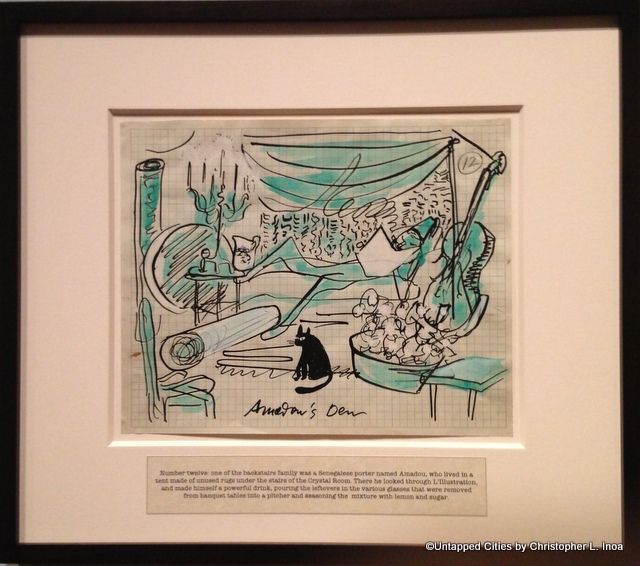
Adieu To The Ritz
Before the Ritz Hotel was demolished in 1951, Town & Country magazine commissioned Bemelmans to write his memoirs inside his former place of employment. The result was not only a detailed book about his career, but also a series of drawings detailing the staff and residents of the Ritz hotel in its final days. The 21 drawings were all featured in the magazine and are on display inside the exhibit.
Madeline in New York: The Art of Ludwig Bemelmans opens Friday, July 4, and will run until October 19 this year. It’s a fitting tribute to an explorer who created a character with timeless appeal.
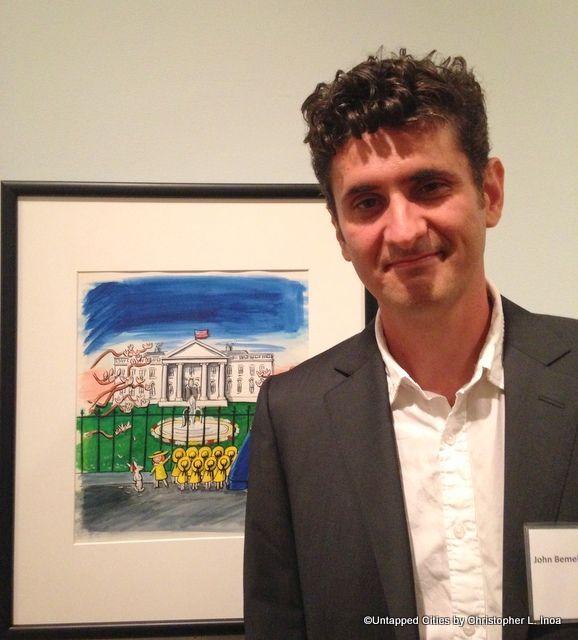
Ludwig Bemelmans’ grandson John and his cover of Madeline At the White House.
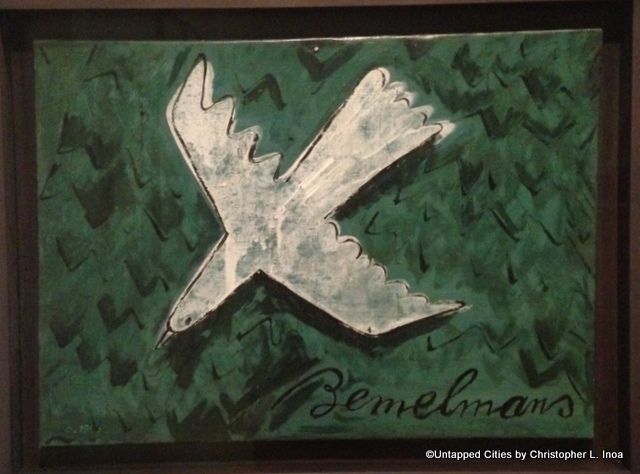
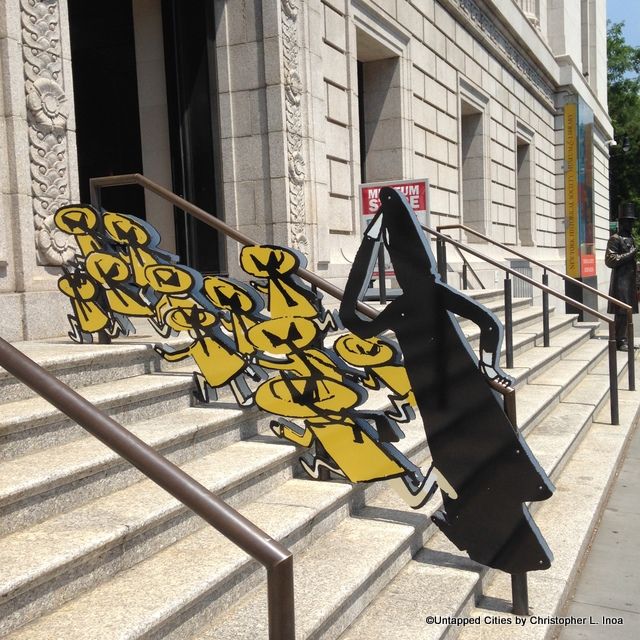
Contact the author @TatteredFedora. Just know he is not afraid to say he likes Madeline.
Subscribe to our newsletter